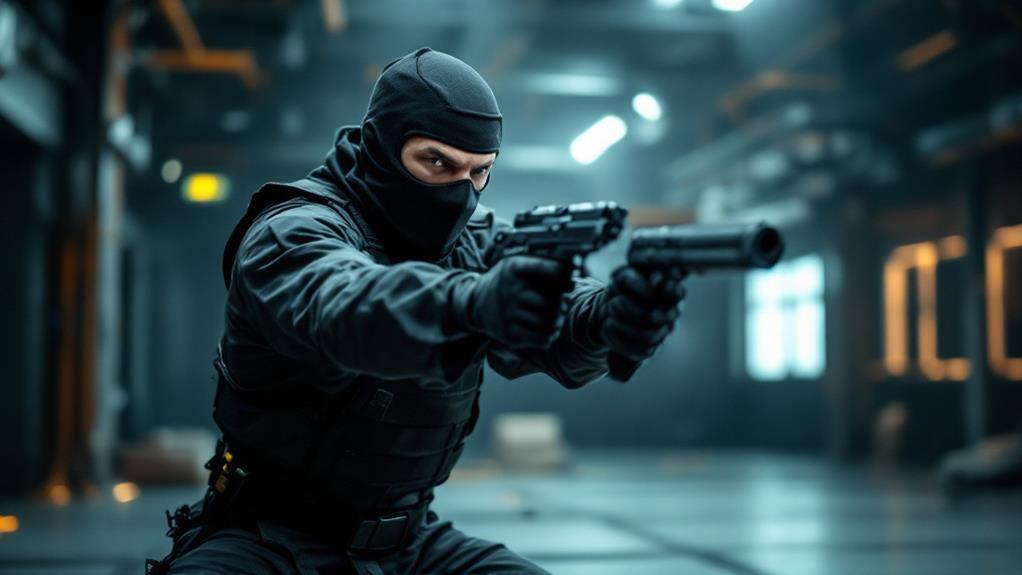Interesting Facts About Personal Bodyguards for the Elite

You're exploring a fascinating domain where personal bodyguards for the elite have evolved from ancient times, like Rome's Praetorian guards, to modern close protection experts. Today's bodyguards combine intelligence gathering with advanced skills, like evasive driving and crisis management, to tailor their security measures. They often use open-source intelligence to anticipate threats and create strategic defense plans. Although not all are combat experts, quick decision-making is essential. Personal security extends into travel risk management and private investigations, ensuring a thorough safety net. There's much more to uncover about how they blend tradition with innovation for elite protection.
Historical Roles and Evolution
The profession of bodyguarding has deep historical roots, with early examples like the Praetorian guards protecting Roman generals, highlighting the timeless need for personal security. Throughout history, figures such as popes and royalty relied on bodyguards, showing the enduring connection between elites and their protection services. Varied cultures had their own elite security personnel, like the Varangian guards in Byzantium and the Samurai in Japan, each adapting to the unique threats of their time.
As you investigate the evolution of bodyguards, you'll notice how their roles have transformed. Today, the term encompasses more specialized roles like close protection officers and executive protection officers. These modern bodyguards are more than just a physical shield; they offer advanced training and strategic expertise. They are highly trained in different aspects of security, ensuring that their clients can enjoy peace of mind knowing they're in capable hands.
Modern protection services reflect the integration of advanced skills, adapting to new challenges and needs. Personal protection officers not only focus on physical defense but also incorporate strategic planning to mitigate risks. This evolution from ancient protectors to sophisticated security experts underscores the importance of personal security throughout history.
Intelligence in Modern Security
In modern security, intelligence plays an essential role in shaping effective bodyguard operations. You'll find that bodyguards rely heavily on intelligence to conduct thorough threat assessments and develop strategic protection plans. By using both open-source intelligence (OSINT) and classified information, they can tailor security measures to meet specific client needs. This proactive approach guarantees personal security isn't left to chance, but rather informed by reliable data.
However, the effectiveness of these operations can be compromised by limited sharing of classified information among government units, which can impact general security measures. Despite these challenges, the rise of terrorist threats has underscored the necessity for intelligence in bodyguard services. Security professionals have had to shift from a reactive to a proactive approach, staying one step ahead to guarantee the highest level of protection.
With continuous adaptation, bodyguards adjust their tactics based on the latest intelligence, making threat assessment and response planning integral parts of their duties. By understanding what information is vital, they can implement strategic protection plans that effectively safeguard their clients. This intelligence-driven strategy not only meets client needs but amplifies the general effectiveness of personal security.
Specialized Training Techniques

Understanding intelligence's role in contemporary security highlights the necessity for specialized training techniques that prepare bodyguards for real-world challenges. As an executive protection officer, you're required to master a diverse set of skills to efficiently handle safety concerns. Your training isn't just about physical prowess but includes advanced driving techniques to maneuver through potential ambushes or escape routes. Personal security detail must be versed in emergency primary aid, guaranteeing quick response to any injuries during a crisis.
In addition to physical training, you're also educated on the latest private security technologies. This involves learning surveillance detection and cyber threat assessment to protect clients from modern threats. As a bodyguard, decision-making under pressure is vital, so your training emphasizes situational awareness and the ability to adapt quickly to changing environments.
Conflict de-escalation plays a significant role in your skill set. Rather than resorting to force, you're trained to manage volatile situations diplomatically. Soft skills like diplomacy and effective communication guarantee you maintain a client's safety while respecting their personal privacy. It's this balanced approach that defines the elite training of executive protection officers in the current dynamic security landscape.
Myths and Realities
Imagine a scenario where you're hiring a personal bodyguard and are bombarded with misconceptions. You might think that bodyguards and executive protection agents are the same, but they're not. While professional bodyguards react to emergencies, executive protection involves foresight to prevent crises, helping you stay one step ahead of potential security threats. Many assume only the wealthy need private protection. In reality, geopolitical risks and specific security threats can necessitate security services for anyone.
Another myth is that armed bodyguards automatically mean extra protection. However, the need for firearms relies on the specific situation and assessed risk levels, not just a blanket approach. Your security details aren't solely responsible for your safety. Client preparedness and training play significant roles in guaranteeing your protection, especially during travel.
Contrary to popular belief, not all bodyguards possess extensive combat training. Their primary skills often involve intelligence, surveillance, and quick decision-making rather than sheer physical strength. Professional bodyguards are trained to save lives using a strategic approach that incorporates these expertise areas. By understanding these realities, you can make informed decisions about your security needs and guarantee effective protection.
Services Beyond Protection

As misconceptions about personal bodyguards are dispelled, it's clear that their roles extend far beyond mere protection. When you think of elite personal bodyguards, envision a private security officer who not only shields you from immediate dangers but also anticipates and mitigates potential threats. These professionals offer a suite of bodyguard services that include travel risk management, guaranteeing you stay safe during business travel. They conduct pre-trip security assessments, liaise with local law enforcement, and deploy teams to evaluate local security conditions, providing protection throughout your expedition.
In high-risk destinations, their careful planning guarantees your safety. But their expertise doesn't stop at physical security. Crisis management is another critical service, with tailored emergency response strategies ready for scenarios like natural disasters or security breaches. A reputable security company will also offer private investigations, performing background checks or gathering intelligence to shield you from unseen dangers.
For families, specialized programs provide all-encompassing measures, like cybersecurity strategies and financial protection. These services are designed to safeguard high-net-worth individuals and their loved ones. Fundamentally, elite personal bodyguards are your all-encompassing security solution, guaranteeing peace of mind in every aspect of your life.




